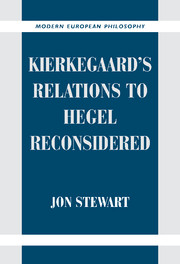Book contents
- Frontmatter
- Contents
- Acknowledgements
- Abbreviations of Primary Texts
- Preface
- Introduction
- 1 Kierkegaard and Danish Hegelianism
- 2 Traces of Hegel in From the Papers of One Still Living and the Early Works
- 3 The Ironic Thesis and Hegel's Presence in The Concept of Irony
- 4 Hegel's Aufhebung and Kierkegaard's Either/Or
- 5 Kierkegaard's Polemic with Martensen in Johannes Climacus, or De omnibus dubitandum est
- 6 Kierkegaard's Repetition and Hegel's Dialectical Mediation
- 7 Hegel's View of Moral Conscience and Kierkegaard's Interpretation of Abraham
- 8 Martensen's Doctrine of Immanence and Kierkegaard's Transcendence in the Philosophical Fragments
- 9 The Dispute with Adler in The Concept of Anxiety
- 10 The Polemic with Heiberg in Prefaces
- 11 Subjective and Objective Thinking: Hegel in the Concluding Unscientific Postscript
- 12 Adler's Confusions and the Results of Hegel's Philosophy
- 13 Kierkegaard's Phenomenology of Despair in The Sickness unto Death
- 14 Kierkegaard and the Development of Nineteenth-Century Continental Philosophy: Conclusions, Reflections, and Reevaluations
- Foreign Language Summaries
- Bibliographies
- Subject Index
- Index of Persons
3 - The Ironic Thesis and Hegel's Presence in The Concept of Irony
Published online by Cambridge University Press: 13 March 2010
- Frontmatter
- Contents
- Acknowledgements
- Abbreviations of Primary Texts
- Preface
- Introduction
- 1 Kierkegaard and Danish Hegelianism
- 2 Traces of Hegel in From the Papers of One Still Living and the Early Works
- 3 The Ironic Thesis and Hegel's Presence in The Concept of Irony
- 4 Hegel's Aufhebung and Kierkegaard's Either/Or
- 5 Kierkegaard's Polemic with Martensen in Johannes Climacus, or De omnibus dubitandum est
- 6 Kierkegaard's Repetition and Hegel's Dialectical Mediation
- 7 Hegel's View of Moral Conscience and Kierkegaard's Interpretation of Abraham
- 8 Martensen's Doctrine of Immanence and Kierkegaard's Transcendence in the Philosophical Fragments
- 9 The Dispute with Adler in The Concept of Anxiety
- 10 The Polemic with Heiberg in Prefaces
- 11 Subjective and Objective Thinking: Hegel in the Concluding Unscientific Postscript
- 12 Adler's Confusions and the Results of Hegel's Philosophy
- 13 Kierkegaard's Phenomenology of Despair in The Sickness unto Death
- 14 Kierkegaard and the Development of Nineteenth-Century Continental Philosophy: Conclusions, Reflections, and Reevaluations
- Foreign Language Summaries
- Bibliographies
- Subject Index
- Index of Persons
Summary
Kierkegaard's dissertation, The Concept of Irony, with Constant Reference to Socrates (1841), is the first work in which there are clear signs of a careful study of Hegel's primary texts. Up until this point in Kierkegaard's incipient literary career, the references to Hegel are vague, and there are no extended textual analyses of his works. By contrast, The Concept of Irony contains several quotations from a number of Hegel's writings and lectures as well as detailed discussions of a number of his most famous analyses. The absence of such quotations and analyses in the works prior to this makes it difficult to evaluate with any certainty what Kierkegaard actually knew of Hegel, but here for the first time there is a wealth of material that can be evaluated. In this work Kierkegaard cites extensively Hegel's Lectures on the Philosophy of History, History of Philosophy, and Aesthetics as well as the Philosophy of Right and Hegel's review of Solger's posthumous writings.
In The Concept of Irony Kierkegaard's main object of study is irony as employed by Socrates. This analysis occupies all of Part One and some of Part Two of the work. But the text goes beyond a study of the figure of Socrates himself.
- Type
- Chapter
- Information
- Kierkegaard's Relations to Hegel Reconsidered , pp. 132 - 181Publisher: Cambridge University PressPrint publication year: 2003
- 1
- Cited by

